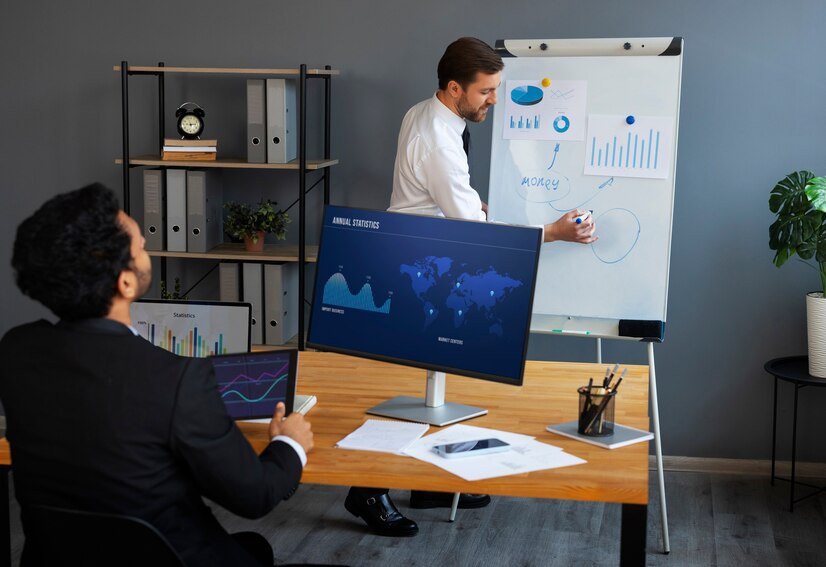

The world of cloud computing has been on a meteoric rise, reshaping industries and the way we work, live, and innovate. By 2025, cloud computing is set to revolutionize business operations even further, with trends pointing towards greater efficiency, enhanced security, and unmatched scalability. For businesses eager to stay ahead, best cloud computing solutions are no longer optional—they’re essential. Whether you’re an enterprise seeking to optimize operations or a startup aiming for rapid scalability, the cloud is the ultimate game-changer.
In this blog, we’ll dive deep into the future of cloud computing, covering the key trends and predictions for 2025. Stick around for insights into how leveraging custom Salesforce solutions can align your business for success in the ever-evolving digital landscape.
The Cloud Evolution: A Brief Look Back
Cloud computing began as a way to store data remotely, but its capabilities quickly expanded to cover software deployment, big data analytics, artificial intelligence (AI), and more. Businesses have increasingly turned to the cloud to lower operational costs, scale on demand, and innovate faster.
By 2025, the cloud will be more integral to businesses than ever. With hybrid models, edge computing, and AI-driven cloud services taking the lead, the focus will shift from “Why cloud?” to “How much more can the cloud do?
1. Hybrid Cloud Models Take Center Stage
One of the clearest trends for 2025 is the dominance of hybrid cloud models. Combining public and private cloud environments, hybrid solutions offer businesses unparalleled flexibility.
- Why It Matters: Enterprises are seeking customizable cloud environments to meet specific regulatory and performance needs. Hybrid cloud models provide this balance while ensuring secure data storage.
- Who Benefits?: Industries like healthcare, finance, and government sectors, where compliance and data sovereignty are critical.
- What’s Next?: Companies offering the best cloud computing solutions will focus on seamless integration between public and private clouds, ensuring reduced latency and cost efficiency.
2. Edge Computing to Support Real-Time Applications
As businesses demand real-time data processing, edge computing is becoming a critical extension of the cloud. Instead of processing data in a central server, edge computing processes it near the source, reducing latency and enabling faster decision-making.
- Impact Areas:
- Autonomous Vehicles
- Smart Manufacturing
- IoT devices in healthcare and retail
- 2025 Outlook: Edge computing will complement cloud infrastructure, creating opportunities for businesses to optimize operations with lightning-fast responses.
3. AI-Driven Cloud Services
Artificial intelligence and machine learning (ML) are increasingly baked into cloud platforms, streamlining workflows, automating mundane tasks, and enabling predictive analytics.
- Key Predictions for 2025:
- Enhanced AI tools will improve cloud security by predicting and preventing breaches.
- AI-driven data analytics will provide businesses with actionable insights, enhancing decision-making.
- Natural Language Processing (NLP) in custom Salesforce solutions will improve customer interactions and make CRM systems more intuitive.
4. Sustainability Takes the Spotlight
Sustainability isn’t just a buzzword anymore—it’s a necessity. By 2025, cloud providers will focus heavily on reducing their carbon footprints and promoting green energy.
- Eco-Friendly Initiatives:
- Adoption of energy-efficient data centers
- Greater reliance on renewable energy
- Development of tools for businesses to monitor and offset their carbon usage in the cloud
- Why It Matters: Sustainability initiatives in the cloud will help companies align with global ESG (Environmental, Social, and Governance) standards, boosting both reputation and compliance.
5. Serverless Computing Gains Traction
Serverless computing allows developers to build and deploy applications without worrying about the underlying infrastructure. By 2025, this trend will dominate application development.
- Advantages:
- Pay-as-you-go pricing models
- Faster deployment cycles
- Reduced infrastructure management
- Business Benefits: From startups to enterprises, serverless computing will make it easier to innovate without the usual overhead costs of managing servers.
6. Greater Emphasis on Security and Compliance
As cyber threats grow, businesses will turn to advanced cloud security solutions to protect their data and systems. By 2025, cloud platforms will offer more sophisticated security measures, powered by AI and machine learning.
- Notable Trends:
- Zero-trust security models will become standard.
- End-to-end encryption and blockchain technology will bolster data protection.
- Compliance automation tools will help businesses navigate evolving regulations.
For businesses adopting best cloud computing solutions, security will be the linchpin of success in the digital age.
7. Vertical-Specific Cloud Solutions
Another exciting trend for 2025 is the rise of industry-specific cloud solutions. Instead of generic cloud platforms, businesses will seek tailored solutions that meet their unique needs.
- Examples:
- Healthcare: Cloud platforms designed for electronic health records (EHRs) and telemedicine
- Retail: Solutions for supply chain optimization and personalized customer experiences
- Finance: Cloud platforms with built-in compliance tools for financial regulations
Custom Salesforce solutions, for instance, can be adapted for diverse industries, helping organizations streamline operations and enhance customer satisfaction.
8. Cloud-Native Development Becomes the Norm
By 2025, cloud-native development will dominate the software landscape. Using cloud-native architectures such as microservices and containers, developers can build scalable and agile applications.
- Key Drivers:
- Faster application development and deployment cycles
- Reduced infrastructure dependency
- Improved resilience through decentralized operations
- For Businesses: Adopting cloud-native principles will be essential for those looking to innovate and stay competitive.
9. 5G Integration with the Cloud
The rollout of 5G networks is expected to amplify the capabilities of cloud computing. Faster data transfer speeds and reduced latency will make the cloud more accessible and reliable.
- Future Applications:
- Streaming augmented reality (AR) and virtual reality (VR) content
- Enhancing IoT ecosystems
- Enabling ultra-reliable, low-latency communications (URLLC)
- 2025 Vision: Businesses leveraging 5G-integrated cloud solutions will deliver superior user experiences, creating a competitive edge in their markets.
10. Collaborative Tools and Remote Work
The pandemic reshaped workplace dynamics, accelerating the adoption of cloud-based collaboration tools. By 2025, these tools will become even more robust, integrating AI and AR for enhanced remote work experiences.
- What to Expect:
- Virtual workspaces combining cloud, AI, and AR for immersive collaboration
- Better synchronization of custom Salesforce solutions with other tools
- Enhanced productivity features like real-time analytics and automation
Adapting to the Cloud Future: A Call to Action
The future of cloud computing is exciting, but staying ahead of these trends requires strategic planning. Whether it’s adopting hybrid models, integrating AI, or leveraging custom Salesforce solutions, businesses must be ready to embrace change.
Why Choose Melonleaf?
At Melonleaf Consulting, we specialize in empowering businesses with cutting-edge cloud solutions. Whether you’re looking for the best cloud computing solutions to transform your operations or custom Salesforce solutions tailored to your industry, we’re here to help. Our team of experts ensures seamless cloud integration, driving innovation and efficiency in your organization.
Your Future Awaits
Don’t let your competitors outpace you. Connect with Melonleaf Consulting today to discover how we can elevate your business with the power of the cloud. Together, let’s shape your success in 2025 and beyond!


















